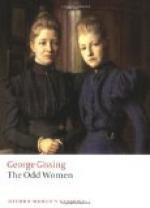‘You scoundrel!’ he cried, when, on the next day, Barfoot presented himself at the house. ’This is your doing. What the deuce do you mean? A man who complains of poverty! Well, it’s the greatest kindness I ever received, that’s all. Fanny will be devoted to you. With music in the house, our blind sister will lead quite a different life. Confound it! I want to begin crying. Why, man, I’m not accustomed to receive presents, even as a proxy; I haven’t had one since I was a schoolboy.’
’That’s an audacious statement. When you told me that Miss Wheatley never allowed your birthday to pass without sending something.’
’Oh, Fanny! But I have never thought of Fanny as a separate person. Upon my word, now I think of it, I never have. Fanny and I have been one for ages.’
That evening the sisters arrived from their country home. Micklethwaite gave up the house to them, and went to a lodging.
It was with no little curiosity that, on the appointed morning, Barfoot repaired to South Tottenham. He had seen a photograph of Miss Wheatley, but it dated from seventeen years ago. Standing in her presence, he was moved with compassion, and with another feeling more rarely excited in him by a women’s face, that of reverential tenderness. Impossible to recognize in this countenance the features known to him from the portrait. At three-and-twenty she had possessed a sweet, simple comeliness on which any man’s eye would have rested with pleasure; at forty she was wrinkled, hollow-cheeked, sallow, indelible weariness stamped upon her brow and lips. She looked much older than Mary Barfoot, though they were just of an age. And all this for want of a little money. The life of a pure, gentle, tender-hearted woman worn away in hopeless longing and in hard struggle for daily bread. As she took his hand and thanked him with an exquisite modesty for the present she had received, Everard felt a lump rise in his throat. He was ashamed to notice that the years had dealt so unkindly with her; fixing his look upon her eyes, he gladdened at the gladness which shone in them, at the soft light which they could still shed forth.
Micklethwaite was probably unconscious of the poor woman’s faded appearance. He had seen her from time to time, and always with the love which idealizes. In his own pathetic phrase, she was simply a part of himself; he no more thought of criticizing her features than of standing before the glass to mark and comment upon his own. It was enough to glance at him as he took his place beside her, the proudest and happiest of men. A miracle had been wrought for him; kind fate, in giving her to his arms, had blotted out those long years of sorrow, and to-day Fanny was the betrothed of his youth, beautiful in his sight as when first he looked upon her.
Her sister, younger by five years, had more regular lineaments, but she too was worn with suffering, and her sightless eyes made it more distressing to contemplate her. She spoke cheerfully, however, and laughed with joy in Fanny’s happiness. Barfoot pressed both her hands with the friendliest warmth.




